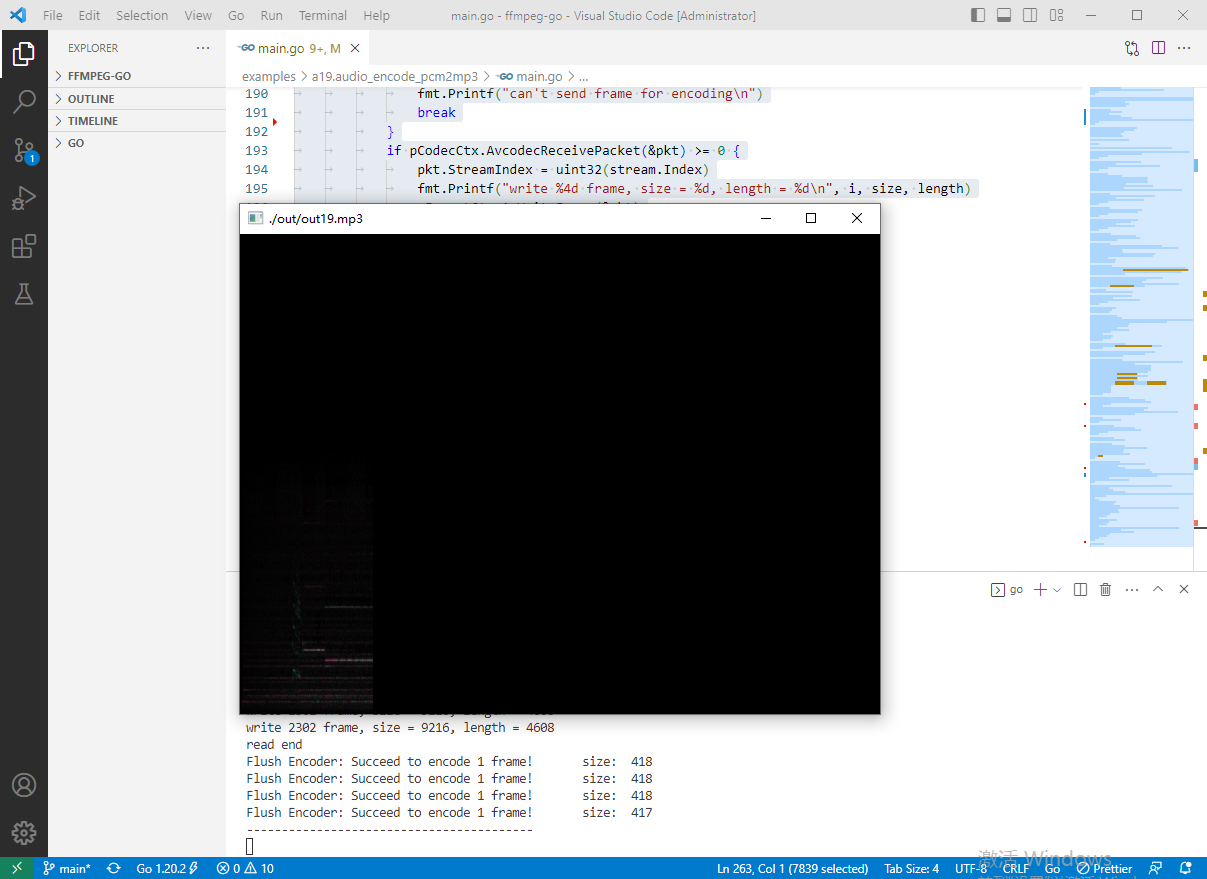2023-03-19:使用Go语言和FFmpeg库实现pcm编码为mp3。
2023-03-19:使用Go语言和FFmpeg库实现pcm编码为mp3。
答案2023-03-19:
本文将介绍如何使用Go语言和FFmpeg库实现PCM音频文件编码为MP3格式。我们将使用moonfdd/ffmpeg-go库,并在Windows 10 64位操作系统下完成本次实验。
代码参考了FFmpeg —— 15.示例程序(九):音频编码器(PCM编码为MP3)和19:pcm编码为mp3。
看完整代码,这个肯定能运行通过。
1.准备工作
安装moonfdd/ffmpeg-go库,运行命令:go get -u github.com/moonfdd/ffmpeg-go
2.实现步骤
2.1.设置FFmpeg库路径
首先需要设置FFmpeg库的路径,在本例中是"./lib"目录下。通过moonfdd/ffmpeg-go库提供的函数SetXXXXPath()可以分别设置各个库的路径:
os.Setenv("Path", os.Getenv("Path")+";./lib")
ffcommon.SetAvutilPath("./lib/avutil-56.dll")
ffcommon.SetAvcodecPath("./lib/avcodec-58.dll")
ffcommon.SetAvdevicePath("./lib/avdevice-58.dll")
ffcommon.SetAvfilterPath("./lib/avfilter-56.dll")
ffcommon.SetAvformatPath("./lib/avformat-58.dll")
ffcommon.SetAvpostprocPath("./lib/postproc-55.dll")
ffcommon.SetAvswresamplePath("./lib/swresample-3.dll")
ffcommon.SetAvswscalePath("./lib/swscale-5.dll")
2.2.准备输入PCM文件
本例中输入的PCM文件是16位采样精度、立体声(2个声道)、44100Hz采样率,文件名为"s16le.pcm",存放在"./out"目录下。如果该文件不存在,则从一个视频文件中提取音频数据并转换格式生成该PCM文件:
inFileName := "./out/s16le.pcm"
_, err = os.Stat(inFileName)
if err != nil {
if os.IsNotExist(err) {
fmt.Println("create pcm file")
exec.Command("./lib/ffmpeg", "-i", "./resources/big_buck_bunny.mp4", "-f", "s16le", "-ar", "44100", "-ac", "2", "-acodec", "pcm_s16le", "-vn", inFileName, "-y").CombinedOutput()
}
}
2.3.打开输出MP3文件
本例中输出的MP3文件名为"out19.mp3",存放在"./out"目录下。首先需要调用libavformat.AvformatAllocOutputContext2()函数分配AVFormatContext结构体,并调用libavformat.AvioOpen()函数打开输出文件:
var pFormatCtx *libavformat.AVFormatContext
libavformat.AvformatAllocOutputContext2(&pFormatCtx, nil, "", outFileName)
if libavformat.AvioOpen(&pFormatCtx.Pb, outFileName, libavformat.AVIO_FLAG_READ_WRITE) < 0 {
fmt.Printf("Cannot open output file.\n")
return
}
2.4.添加输出流
将要输出的音频流添加到输出文件中。首先需要调用libavformat.AvformatNewStream()函数创建一个新的流对象,并将该流对象的Codec属性设置为要输出的音频编解码器属性:
stream := pFormatCtx.AvformatNewStream(nil)
if stream == nil {
fmt.Printf("Cannot create a new stream to output file.\n")
return
}
pCodecCtx = stream.Codec
pCodecCtx.CodecType = libavutil.AVMEDIA_TYPE_AUDIO
pCodecCtx.CodecId = pFormatCtx.Oformat.AudioCodec
pCodecCtx.SampleFmt = libavutil.AV_SAMPLE_FMT_FLTP
pCodecCtx.SampleRate = 44100
pCodecCtx.ChannelLayout = libavutil.AV_CH_LAYOUT_STEREO
pCodecCtx.BitRate = 128000
pCodecCtx.Channels = libavutil.AvGetChannelLayoutNbChannels(pCodecCtx.ChannelLayout)
2.5.查找并打开编码器
根据指定的编码器ID查找对应的编码器对象,调用libavcodec.AvcodecFindEncoder()函数返回对应的AVCodec对象。然后,调用libavcodec.AvcodecOpen2()函数打开编码器并初始化编码器上下文:
pCodec := libavcodec.AvcodecFindEncoder(pCodecCtx.CodecId)
if pCodec == nil {
fmt.Printf("Cannot find encoder.\n")
return
}
if pCodec.AvcodecOpen2(pCodecCtx, nil) < 0 {
fmt.Printf("Cannot open encoder.\n")
return
}
2.6.写入文件头
调用libavformat.AvformatWriteHeader()函数写入输出文件的文件头信息:
if libavformat.AvformatWriteHeader(pFormatCtx, nil) < 0 {
fmt.Printf("Error occurred while writing header.\n")
return
}
2.7.编码音频数据
循环读取输入PCM文件中的音频数据,将其填充到AVFrame对象中,并调用libavcodec.AvcodecSendFrame()函数发送该帧音频数据给编码器。然后循环调用libavcodec.AvcodecReceivePacket()函数接收编码器编码后的数据包,并调用libavformat.AvInterleavedWriteFrame()函数将该数据包写入输出文件中:
for {
ret := inF.Read(buf)
if ret == 0 {
break
}
inBufSize := len(buf)
// fill data to AVFrame structure
pFrame := libavutil.AvFrameAlloc()
defer libavutil.AvFrameFree(pFrame)
pFrame.SetNbSamples(int32(inBufSize) / (2 * 2))
pFrame.SetFormat(pCodecCtx.SampleFmt)
pFrame.SetSampleRate(pCodecCtx.SampleRate)
pFrame.SetChannelLayout(pCodecCtx.ChannelLayout)
for i := 0; i < int(pFrame.NbSamples()); i++ {
for t := 0; t < int(pFrame.Channels()); t++ {
idx := (i*int(pFrame.Channels()) + t) * 2
val := float32(int16(binary.LittleEndian.Uint16(buf[idx:idx+2]))) / (1 << 15)
*(*[]float32)(unsafe.Pointer(&pFrame.ExtendedData))[t][i] = val
}
}
// encode audio frame
if pCodecCtx.AvcodecSendFrame(pFrame) < 0 {
fmt.Printf("Error while sending a frame to the encoder.\n")
return
}
for {
pkt := libavcodec.AvPacketAlloc()
isEof := false
defer libavcodec.AvPacketFree(pkt)
ret := pCodecCtx.AvcodecReceivePacket(pkt)
if ret < 0 {
fmt.Printf("Error while receiving a packet from the encoder.\n")
return
}
if ret == 0 {
break
}
pkt.SetStreamIndex(stream.Index())
pkt.SetPts(libavutil.AvRescaleQ(samplesCount, libavutil.AVR{Num: 1, Den: 44100}, stream.TimeBase()))
samplesCount += int64(pFrame.NbSamples())
// write encoded data to output file
if libavformat.AvInterleavedWriteFrame(pFormatCtx, pkt) != 0 {
fmt.Printf("Error while writing a packet to the container.\n")
return
}
if isEof {
break
}
}
}
2.8.写入文件尾部
最后,调用libavformat.AvWriteTrailer()函数写入输出文件的尾部信息,完成整个音频编码过程:
if libavformat.AvWriteTrailer(pFormatCtx) < 0 {
fmt.Printf("Error occurred while writing trailer.\n")
return
}
3.完整代码
package main
import (
"fmt"
"os"
"os/exec"
"unsafe"
"github.com/moonfdd/ffmpeg-go/ffcommon"
"github.com/moonfdd/ffmpeg-go/libavcodec"
"github.com/moonfdd/ffmpeg-go/libavformat"
"github.com/moonfdd/ffmpeg-go/libavutil"
"github.com/moonfdd/ffmpeg-go/libswresample"
)
func main() {
// https://blog.csdn.net/guoyunfei123/article/details/105643255
// 时长没误差
os.Setenv("Path", os.Getenv("Path")+";./lib")
ffcommon.SetAvutilPath("./lib/avutil-56.dll")
ffcommon.SetAvcodecPath("./lib/avcodec-58.dll")
ffcommon.SetAvdevicePath("./lib/avdevice-58.dll")
ffcommon.SetAvfilterPath("./lib/avfilter-56.dll")
ffcommon.SetAvformatPath("./lib/avformat-58.dll")
ffcommon.SetAvpostprocPath("./lib/postproc-55.dll")
ffcommon.SetAvswresamplePath("./lib/swresample-3.dll")
ffcommon.SetAvswscalePath("./lib/swscale-5.dll")
genDir := "./out"
_, err := os.Stat(genDir)
if err != nil {
if os.IsNotExist(err) {
os.Mkdir(genDir, 0777) // Everyone can read write and execute
}
}
//./lib/ffmpeg -i .\resources\big_buck_bunny.mp4 -f s16le -ar 44100 -ac 2 -acodec pcm_s16le -vn ./out/s16le.pcm
// ./lib/ffmpeg -y -f s16le -ac 2 -ar 44100 -acodec pcm_s16le -vn -i ./out/s16le.pcm ./out/s16le.mp3
inFileName := "./out/s16le.pcm"
// inFileName := "./out/test16.pcm"
outFileName := "./out/out19.mp3"
//是否存在pcm文件
_, err = os.Stat(inFileName)
if err != nil {
if os.IsNotExist(err) {
fmt.Println("create pcm file")
exec.Command("./lib/ffmpeg", "-i", "./resources/big_buck_bunny.mp4", "-f", "s16le", "-ar", "44100", "-ac", "2", "-acodec", "pcm_s16le", "-vn", inFileName, "-y").CombinedOutput()
}
}
var pFormatCtx *libavformat.AVFormatContext
var pCodecCtx *libavcodec.AVCodecContext
var pCodec *libavcodec.AVCodec
var pkt libavcodec.AVPacket
var pFrame *libavutil.AVFrame
//libavdevice.AvdeviceRegisterAll()
for {
libavformat.AvformatAllocOutputContext2(&pFormatCtx, nil, "", outFileName)
if libavformat.AvioOpen(&pFormatCtx.Pb, outFileName, libavformat.AVIO_FLAG_READ_WRITE) < 0 {
fmt.Printf("Cannot open output file.\n")
return
}
stream := pFormatCtx.AvformatNewStream(nil)
if stream == nil {
fmt.Printf("Cannot create a new stream to output file.\n")
return
}
//设置参数
pCodecCtx = stream.Codec
pCodecCtx.CodecType = libavutil.AVMEDIA_TYPE_AUDIO
pCodecCtx.CodecId = pFormatCtx.Oformat.AudioCodec
pCodecCtx.SampleFmt = libavutil.AV_SAMPLE_FMT_FLTP
pCodecCtx.SampleRate = 44100
pCodecCtx.ChannelLayout = libavutil.AV_CH_LAYOUT_STEREO
pCodecCtx.BitRate = 128000
pCodecCtx.Channels = libavutil.AvGetChannelLayoutNbChannels(pCodecCtx.ChannelLayout)
//查找编码器
pCodec = libavcodec.AvcodecFindEncoder(pCodecCtx.CodecId)
if pCodec == nil {
fmt.Printf("Cannot find audio encoder.\n")
return
}
//打开编码器
if pCodecCtx.AvcodecOpen2(pCodec, nil) < 0 {
fmt.Printf("Cannot open encoder.\n")
return
}
//fmtCtx.AvDumpFormat(0, outFileName, 1)
pFrame = libavutil.AvFrameAlloc()
if pFrame == nil {
fmt.Printf("can't alloc frame\n")
return
}
//===========
pFrame.NbSamples = pCodecCtx.FrameSize
pFrame.Format = int32(pCodecCtx.SampleFmt)
pFrame.Channels = 2
// PCM重采样
var swr_ctx *libswresample.SwrContext = libswresample.SwrAlloc()
swr_ctx.SwrAllocSetOpts(libavutil.AvGetDefaultChannelLayout(pCodecCtx.Channels),
pCodecCtx.SampleFmt,
pCodecCtx.SampleRate,
libavutil.AvGetDefaultChannelLayout(pFrame.Channels),
libavutil.AV_SAMPLE_FMT_S16, // PCM源文件的采样格式
44100,
0, uintptr(0))
swr_ctx.SwrInit()
/* 分配空间 */
// uint8_t **convert_data = (uint8_t**)calloc(codecCtx->channels,sizeof(*convert_data));
convert_data := (**byte)(unsafe.Pointer(libavutil.AvCalloc(uint64(pCodecCtx.Channels), 8)))
libavutil.AvSamplesAlloc(convert_data, nil, pCodecCtx.Channels, pCodecCtx.FrameSize,
pCodecCtx.SampleFmt, 0)
size := libavutil.AvSamplesGetBufferSize(nil, pCodecCtx.Channels,
pCodecCtx.FrameSize, pCodecCtx.SampleFmt, 1)
frameBuf := libavutil.AvMalloc(uint64(size))
libavcodec.AvcodecFillAudioFrame(pFrame, pCodecCtx.Channels, pCodecCtx.SampleFmt,
(*byte)(unsafe.Pointer(frameBuf)), size, 1)
//写帧头
pFormatCtx.AvformatWriteHeader(nil)
inFile, err := os.Open(inFileName)
if err != nil {
fmt.Printf("annot open input file.\n")
return
}
pkt.AvInitPacket()
pkt.Data = nil
pkt.Size = 0
for i := 0; ; i++ {
//输入一帧数据的长度
length := pFrame.NbSamples * libavutil.AvGetBytesPerSample(libavutil.AV_SAMPLE_FMT_S16) * pFrame.Channels
//读PCM:特意注意读取的长度,否则可能出现转码之后声音变快或者变慢
buf := make([]byte, length)
n, err := inFile.Read(buf)
if err != nil {
fmt.Println("read end")
break
}
if n <= 0 {
break
}
for j := 0; j < n; j++ {
*(*byte)(unsafe.Pointer(frameBuf + uintptr(j))) = buf[j]
}
swr_ctx.SwrConvert(convert_data, pCodecCtx.FrameSize,
(**byte)(unsafe.Pointer(&pFrame.Data)),
pFrame.NbSamples)
//输出一帧数据的长度
length = pCodecCtx.FrameSize * libavutil.AvGetBytesPerSample(pCodecCtx.SampleFmt)
//双通道赋值(输出的AAC为双通道)
// memcpy(frame->data[0],convert_data[0],length);
// memcpy(frame->data[1],convert_data[1],length);
c := *(*[2]uintptr)(unsafe.Pointer(convert_data))
fd0 := uintptr(unsafe.Pointer(pFrame.Data[0]))
cd0 := uintptr(unsafe.Pointer(c[0]))
fd1 := uintptr(unsafe.Pointer(pFrame.Data[1]))
cd1 := uintptr(unsafe.Pointer(c[1]))
for j := int32(0); j < length; j++ {
*(*byte)(unsafe.Pointer(fd0)) = *(*byte)(unsafe.Pointer(cd0))
*(*byte)(unsafe.Pointer(fd1)) = *(*byte)(unsafe.Pointer(cd1))
fd0++
cd0++
fd1++
cd1++
}
pFrame.Pts = int64(i * 100)
if pCodecCtx.AvcodecSendFrame(pFrame) < 0 {
fmt.Printf("can't send frame for encoding\n")
break
}
if pCodecCtx.AvcodecReceivePacket(&pkt) >= 0 {
pkt.StreamIndex = uint32(stream.Index)
fmt.Printf("write %4d frame, size = %d, length = %d\n", i, size, length)
pFormatCtx.AvWriteFrame(&pkt)
}
pkt.AvPacketUnref()
}
// flush encoder
if flush_encoder(pFormatCtx, 0) < 0 {
fmt.Printf("flushing encoder failed\n")
return
}
// write trailer
pFormatCtx.AvWriteTrailer()
inFile.Close()
stream.Codec.AvcodecClose()
libavutil.AvFree(uintptr(unsafe.Pointer(pFrame)))
libavutil.AvFree(frameBuf)
pFormatCtx.Pb.AvioClose()
pFormatCtx.AvformatFreeContext()
break
}
// codecCtx.AvcodecClose()
// libavutil.AvFree(uintptr(unsafe.Pointer(frame)))
// fmtCtx.Pb.AvioClose()
// fmtCtx.AvformatFreeContext()
fmt.Println("-----------------------------------------")
// ./lib/ffplay -ar 44100 -ac 2 -f s16le -i ./out/test.pcm
//_, err = exec.Command("./lib/ffplay.exe", "-ar", "44100", "-ac", "2", "-f", "s16le", "-i", "./out/test16.pcm").Output()
_, err = exec.Command("./lib/ffplay.exe", outFileName).Output()
if err != nil {
fmt.Println("play err = ", err)
}
}
func flush_encoder(fmt_ctx *libavformat.AVFormatContext, stream_index int) int32 {
ret := int32(0)
var got_frame int32
var enc_pkt libavcodec.AVPacket
if fmt_ctx.GetStream(uint32(stream_index)).Codec.Codec.Capabilities&libavcodec.AV_CODEC_CAP_DELAY == 0 {
return 0
}
for {
enc_pkt.Data = nil
enc_pkt.Size = 0
enc_pkt.AvInitPacket()
ret = fmt_ctx.GetStream(uint32(stream_index)).Codec.AvcodecEncodeAudio2(&enc_pkt,
nil, &got_frame)
//av_frame_free(NULL)
if ret < 0 {
break
}
if got_frame == 0 {
ret = 0
break
}
fmt.Printf("Flush Encoder: Succeed to encode 1 frame!\tsize:%5d\n", enc_pkt.Size)
/* mux encoded frame */
ret = fmt_ctx.AvWriteFrame(&enc_pkt)
if ret < 0 {
break
}
}
return ret
}
4.运行结果
执行命令:
go run ./examples/a19.audio_encode_pcm2mp3/main.go




 浙公网安备 33010602011771号
浙公网安备 33010602011771号